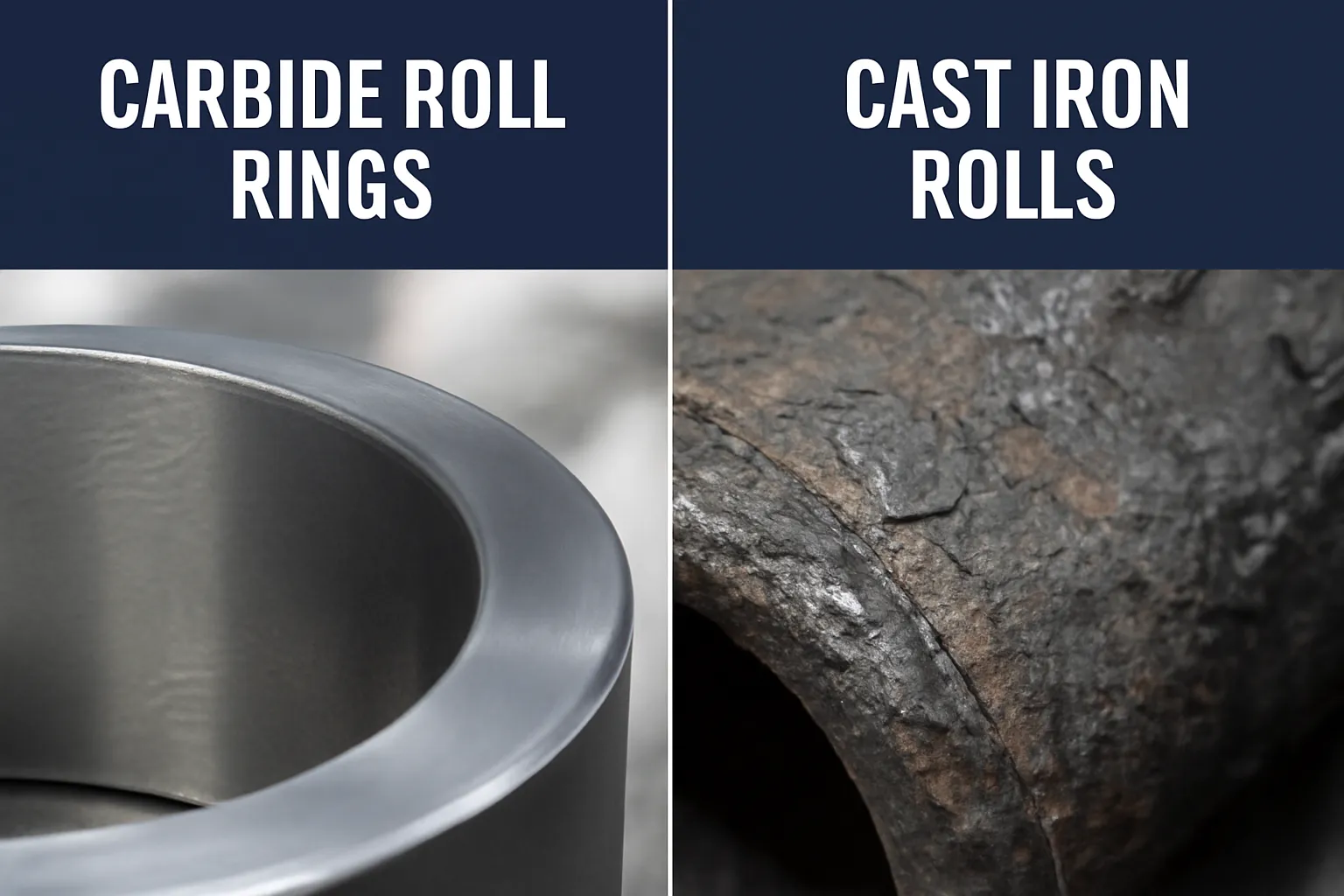Why Carbide Roll Rings Are More Popular Than Traditional Cast Iron Rolls
In many industries, equipment needs to work well and last a long time. These industries include steel, metal processing, electronics, and other sectors where tools face tough conditions. Carbide roll rings are becoming more common than cast iron rolls because they have better material qualities and can handle difficult conditions. At TY High Tech, we know that different industries need equipment that keeps precise and lasts long. In this article, we explain why carbide roll rings are now often used instead of cast iron rolls, especially in high-demand settings like steel rolling and heavy manufacturing.
1. Better Wear Resistance: The Main Factor for Longer Use
Carbide resists wear much more than cast iron. During metal rolling and other heavy tasks, tools experience friction and heat. Carbide, made from tungsten carbide, is much harder than cast iron. Hardness is usually measured between 1600 and 2200 HV. This helps carbide last longer without wearing out quickly.
Why This Matters: Carbide’s hardness allows it to work longer in harsh environments without losing quality. Cast iron wears out faster under stress. This leads to problems like lower product quality, machine downtime, and more frequent tool replacement.
Benefits for Your Business:
- Longer tool life reduces needing replacements.
- Less downtime increases productivity.
2. Better Heat Resistance and Thermal Stability
In steel rolling, high heat can reach over 1,200°C. Tools must stay strong and not crack or lose shape. Cast iron cannot handle such high heat well. Carbide, however, keeps its hardness even at high temperatures. It stays stable and does not deform.
Why This Matters: Carbide can conduct heat well and resist shock from temperature changes. This helps it stay effective during high-heat processes.
Benefits for Your Business:
- Consistent performance at high temperatures.
- Fewer failures or quality issues caused by heat.
3. Accuracy and Stable Dimensions
Bear in mind that tools shape materials precisely. Carbide rolls keep their size and shape even under pressure and high heat. This makes them better for producing consistent quality products over many runs.
Why This Matters: Cast iron wears unevenly over time, which can change the dimensions of the rolled material. Carbide does not wear as much and keeps its shape. This ensures the final product has the correct size and quality.
Benefits for Your Business:
- Better product quality due to precise tools.
- Less waste from errors caused by worn tools.
- Production becomes more predictable and repeatable.
4. Resistance to Chemical Damage
Tools are often exposed to chemicals like lubricants, molten metal, and other agents. Cast iron can corrode in these conditions. Carbide resists corrosion much better. This helps the tools stay in good condition longer.
Why This Matters: Corrosion can cause tools to fail early. It also risks damaging the processed materials. Carbide’s resistance to chemicals ensures consistent performance, even in harsh environments.
Benefits for Your Business:
- Lower costs due to fewer replacements.
- Better protection for tools and products.
- More reliable processes with less downtime.
5. Cost-Effectiveness Over Time
Carbide roll rings cost more at first than cast iron rolls. But they last longer and work better. Because of this, they save money over time. You don't need to replace them as often. There are fewer breakdowns. Maintenance costs go down. This is important if you want to get the best return on your investment.
Why This Matters: Carbide roll rings do not break easily. They help keep your production line working without interruptions. For high-volume manufacturing, this keeps costs low and profits high.
Benefits for Your Business:
- You spend less overall because you need fewer replacements and repairs.
- You get more value from tools that last longer.
- You experience less downtime, which makes your operation more productive.
6. Adaptability to High-Speed Operations
Modern production lines often run at high speeds. In industries like steel making, tools must keep up without losing quality. Carbide roll rings perform well at high speeds. They are better than cast iron in these conditions.
Why This Matters: High-speed operations put stress on tools. Cast iron tools typically wear out or break under such stress. Carbide resists high-speed wear. This helps your machinery work smoothly and efficiently.
Benefits for Your Business:
- You can operate more efficiently at high speeds.
- You reduce the risk of tools breaking and causing stoppages.
- Faster cycle times lead to higher productivity.
Conclusion
Carbide roll rings are becoming the top choice compared to cast iron. They resist wear, stay stable in heat, and are precise and resistant to chemicals. Cast iron has been used for years, but carbide is stronger, lasts longer, and saves money. It is a better option for industries that need high performance and durability.
At TY High Tech, we provide high-quality carbide roll rings. They can handle tough environments. They deliver strong performance and cost savings. If you want to improve your production, make tools last longer, and reduce stoppages, carbide roll rings are the right choice. For more details or to ask about our products, contact us today!

Related product categories
- corrosion-resistant carbide rolls for steel mills
- long-lasting carbide roll rings for pilger mills
- carbide roll rings for hot rolling
- durable carbide roll rings for hot rolling
- tungsten carbide roll rings for OEMs
- custom-manufactured roll rings for mance roller rings
- tungsten carbide roll ring suppliers Israel
- wear-resistant roller rings United States
- bulk purchase of roll rings United States
- cnc end mill tools
- cemented carbide inserts
- china milling router bit
 EN
EN UR
UR ru
ru bn
bn ar
ar ky
ky th
th fil
fil vi
vi ms
ms tr
tr ro
ro pt
pt es
es af
af fa
fa uk
uk nl
nl pl
pl fr
fr de
de

